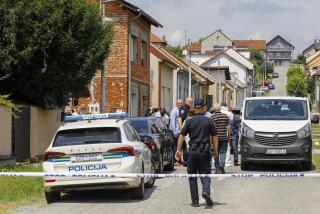Bosnian Croat Sentenced in Massacre
- Share via
BELGRADE, Yugoslavia — In the first international sentencing for war crimes since World War II, a tribunal at The Hague on Friday condemned a young Bosnian Croat to 10 years in prison for his role in the massacre of 1,200 unarmed Muslims by a Bosnian Serb army execution squad.
The victims were among an estimated 7,000 Muslim men and boys believed slain after Bosnian Serb forces overran the U.N.-declared “safe haven” of Srebrenica in eastern Bosnia on July 11, 1995.
Drazen Erdemovic, a 25-year-old former soldier, confessed to taking part in the killings, regarded by human rights officials as the worst atrocity in a brutal 3 1/2-year war. Busloads of captured men, some blindfolded, some begging for their lives, were lined up on a remote farm in Serb-held Bosnia and gunned down by an eight-member Bosnian Serb army squad that included Erdemovic, according to his accounts.
The bodies were then bulldozed into mass graves.
Friday’s sentencing represented a rare moment of success for the United Nations war crimes tribunal, which has indicted 74 suspects but has been able to prosecute only two.
Most suspected war criminals--including the Bosnian Serbs’ wartime political and military leaders, Radovan Karadzic and Gen. Ratko Mladic--remain at large in Bosnia-Herzegovina, Croatia and the rump Yugoslavia.
It appears that little or no effort is being made by local or international authorities in those countries to detain the suspects.
North Atlantic Treaty Organization-led peacekeepers who are enforcing the accords that ended the war in Bosnia last year have thus far resisted international demands that they pursue the suspects.
In testimony July 5 in The Hague, Erdemovic told the court that he briefly saw Mladic in the days after the fall of the Srebrenica.
On Friday, Erdemovic sat silently as Judge Claude Jorda of France read the sentence.
The former soldier covered his face at one point when the judge rejected defense claims that Erdemovic had to follow orders to kill or risk being killed himself.
Jorda instead followed a prosecution recommendation for leniency because of Erdemovic’s age, his show of remorse and his cooperation with tribunal investigators.
His lawyer, Jovan Babic, said he would appeal the verdict, which he said was too harsh.
Prosecutors hailed Erdemovic’s contribution to establishing the first independent evidence that the Srebrenica massacres took place, in the face of Bosnian Serb claims that the stories of mass killings are Muslim propaganda.
Still, the Tuzla native who flitted from army to army during the wars in the former Yugoslav federation was only a bit player in a much larger drama.
Erdemovic first came to light as a confessed murderer in March in Belgrade, where he decided to surrender and give evidence to the court in The Hague. He reportedly attempted to turn himself in to the U.S. Embassy, which referred him instead to journalists.
He gave his account to the French newspaper Le Figaro. Hours later he was arrested by state security officers working for Serbian President Slobodan Milosevic.
Erdemovic was held for several weeks until Serb officials were pressured by tribunal prosecutors to release him to their custody.
In his statements to Le Figaro, Erdemovic claimed that he had killed 70 prisoners.
“I tried to kill as few people as possible,” he told the newspaper. “I did my best not to shoot the youngest.”
The victims were killed over a five-hour period and ranged in age from late teens to the mid-50s, Erdemovic said. They apparently were men who did not try to escape Srebrenica but sought refuge with their families in a U.N. peacekeeping compound outside the fallen enclave.
The Dutch peacekeepers at the compound eventually turned the Muslim men over to the Bosnian Serbs, according to witnesses.
*
“I feel sorry for all the victims,” Erdemovic said in a closing statement at a hearing last week. “Not only for the ones who were killed at that farm. I feel sorry for all the victims in the former Bosnia-Herzegovina, regardless of their nationality.”
In the only other tribunal prosecution, another panel of judges is considering its verdict in the case of Dusan Tadic, a Bosnian Serb accused of murder, rape and torture at a detention camp in northern Serb-held Bosnia where Muslims were rounded up and brutalized. Tadic has pleaded innocent.
More to Read
Sign up for Essential California
The most important California stories and recommendations in your inbox every morning.
You may occasionally receive promotional content from the Los Angeles Times.











